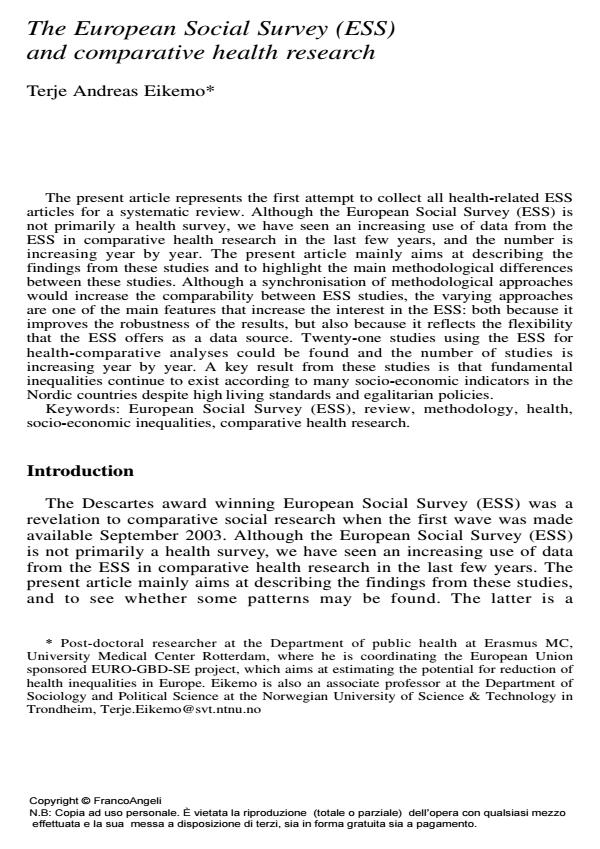The European Social Survey (ESS) and comparative health research
Journal title SALUTE E SOCIETÀ
Author/s Terje Andreas Eikemo
Publishing Year 2010 Issue 2010/suppl. En. 2
Language English Pages 23 P. 95-117 File size 640 KB
DOI 10.3280/SES2010-SU1007
DOI is like a bar code for intellectual property: to have more infomation
click here
Below, you can see the article first page
If you want to buy this article in PDF format, you can do it, following the instructions to buy download credits

FrancoAngeli is member of Publishers International Linking Association, Inc (PILA), a not-for-profit association which run the CrossRef service enabling links to and from online scholarly content.
The present article represents the first attempt to collect all health-related ESS articles for a systematic review. Although the European Social Survey (ESS) is not primarily a health survey, we have seen an increasing use of data from the ESS in comparative health research in the last few years, and the number is increasing year by year. The present article mainly aims at describing the findings from these studies and to highlight the main methodological differences between these studies. Although a synchronisation of methodological approaches would increase the comparability between ESS studies, the varying approaches are one of the main features that increase the interest in the ESS: both because it improves the robustness of the results, but also because it reflects the flexibility that the ESS offers as a data source. Twenty-one studies using the ESS for health-comparative analyses could be found and the number of studies is increasing year by year. A key result from these studies is that fundamental inequalities continue to exist according to many socio-economic indicators in the Nordic countries despite high living standards and egalitarian policies.
Keywords: European Social Survey (ESS), review, methodology, health, socio-economic inequalities, comparative health research.
- How do gender based disparities affect women’s self-rated health and anxiety in the European Union? Adolfo Cosme Fernandez Puente, Nuria Sanchez-Sanchez, in Journal of Gender Studies /2021 pp.786
DOI: 10.1080/09589236.2021.1899904 - Chronic illness and informal social capital: Individual level mediators and country-level moderators Elize BA Vis, Tessa M van de Rozenberg, Peer LH Scheepers, in Acta Sociologica /2019 pp.372
DOI: 10.1177/0001699318772080 - Cross-national differences in the gender gap in subjective health in Europe: Does country-level gender equality matter? Johanna Dahlin, Juho Härkönen, in Social Science & Medicine /2013 pp.24
DOI: 10.1016/j.socscimed.2013.08.028
Terje Andreas Eikemo, The European Social Survey (ESS) and comparative health research in "SALUTE E SOCIETÀ" suppl. En. 2/2010, pp 95-117, DOI: 10.3280/SES2010-SU1007